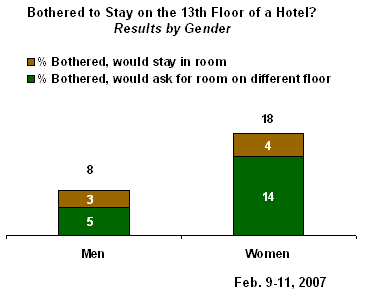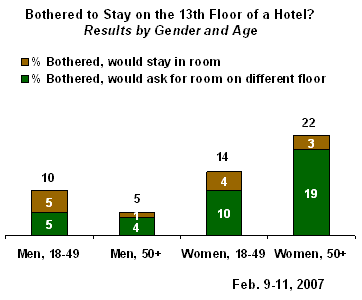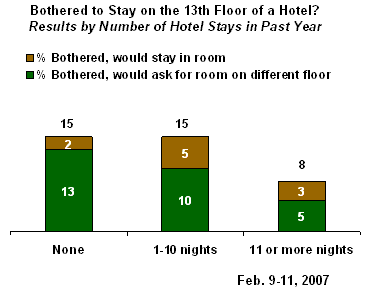GALLUP NEWS SERVICE
PRINCETON, NJ -- The interesting phenomenon of fear of the number 13, technically known as triskaidekaphobia, has significant economic implications. Developers of hotels and office buildings have to make the decision whether to include a 13th floor to avoid occupants superstitious desire to avoid working or staying on such a floor. Many hotels in Las Vegas, where luck and superstition are important psychological factors, do not have 13th floors, and other large hotel chains routinely skip from the 12th to the 14th floor, although, technically, the 14th floor is really the 13th floor of that building.
The Feb. 9-11, 2007 USA Today/Gallup poll asked Americans how much it would bother them to stay in a room on the 13th floor of a hotel.
The results show that an overwhelming 87% say they would not be bothered if they were assigned to the 13th floor of a hotel, while -- interestingly -- exactly 13% of those interviewed say it would bother them.
Those bothered by staying on the 13th floor are much more likely to say they would ask the hotel to give them a room on a different floor (74%) rather than to stay in the room on the 13th floor (22%). All told, 9% of all Americans would be concerned enough about staying on the 13th floor that they would ask for a different room assignment.
Suppose you checked into a hotel and were given a room on the thirteenth floor. Would this bother you, or not?
(Asked of those who would be bothered to be given a room on the thirteenth floor): Would you ask the hotel to give you a room on a different floor, or would you stay in the room on the thirteenth floor?
COMBINED RESPONSES: BASED ON A FULL SAMPLE
|
2007 Feb 9-11 |
|
|
% |
|
|
Bothered if given room on 13th floor |
13 |
|
(Ask for a room on different floor) |
(9) |
|
(Stay in room on 13th floor) |
(3) |
|
(Unspecified) |
(1) |
|
|
|
|
Not bothered if given room on 13th floor |
87 |
|
|
|
|
No opinion |
* |
|
* = Less than 0.5% |
|
Although the vast majority of all Americans would not be bothered if they were given a room on the 13th floor of a hotel, certain demographic groups are more likely than others to be bothered about sleeping on this floor of a hotel.
Women (18%) are more than twice as likely as men (8%) to say they would be bothered to stay in a hotel room on the 13th floor. Women are also more likely than men to say they would change rooms, at 14% vs. 5%, respectively.

Younger and older Americans show only minor variation in their views on this matter, with 12% of 18- to 49-year-olds and 14% those aged 50 and older saying it would bother them to sleep on the 13th floor of a hotel.
But, the results to this question by combined age and gender groups show significant differences. Women aged 50 and older express a higher level of concern about sleeping in a hotel room on the 13th floor than do younger women or men of any age.

The poll finds Americans report staying an average of 8.7 nights in a hotel over the past year. This includes 27% who have not stayed at a hotel once in the past year, 48% who have visited a hotel between 1 and 10 times, and 25% who have slept at a hotel 11 times or more.
Concerns about sleeping on the 13th floor of a hotel vary by the degree to which people have stayed in a hotel in the past year, with infrequent hotel guests somewhat more likely than frequent hotel guests to say they are bothered by sleeping on the 13th floor.
Nearly one in six Americans who have stayed 10 nights or fewer (15%) say they would be bothered to sleep on the 13th floor. Just 8% of those who have visited a hotel 11 or more times say they would be bothered.

There is little variation between frequent and infrequent hotel visitors' opinions about asking to change rooms if their initial hotel room was located on the 13th floor.
Survey Methods
Results are based on telephone interviews with 1,006 national adults, aged 18 and older, conducted Feb. 9-11, 2007. For results based on the total sample of national adults, one can say with 95% confidence that the maximum margin of sampling error is ±3 percentage points. In addition to sampling error, question wording and practical difficulties in conducting surveys can introduce error or bias into the findings of public opinion polls.32. Suppose you checked into a hotel and were given a room on the thirteenth floor. Would this bother you, or not?
|
Yes, would be
|
No,
|
No
|
|
|
% |
% |
% |
|
|
2007 Feb 9-11 |
13 |
87 |
* |
|
* = Less than 0.5% |
|||
33. (Asked of those who would be bothered to be given a room on the thirteenth floor): Would you ask the hotel to give you a room on a different floor, or would you stay in the room on the thirteenth floor?
COMBINED RESPONSES (Q.32-33): BASED ON A FULL SAMPLE
|
2007 Feb 9-11 |
|
|
% |
|
|
Bothered if given room on 13th floor |
13 |
|
(Ask for a room on different floor) |
(9) |
|
(Stay in room on 13th floor) |
(3) |
|
(Unspecified) |
(1) |
|
|
|
|
Not bothered if given room on 13th floor |
87 |
|
|
|
|
No opinion |
* |
|
* = Less than 0.5% |
|
34. Thinking back over the past year, about how many nights did you, personally, stay in a hotel?
|
2007 Feb 9-11 |
|
|
% |
|
|
None |
27 |
|
1-5 |
28 |
|
6-10 |
20 |
|
11-20 |
16 |
|
20 or more |
9 |
|
|
|
|
No opinion |
1 |
|
|
|
|
Mean |
8.7 |
|
Median |
5 |